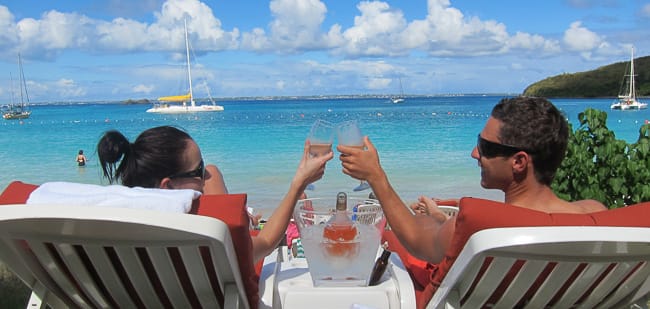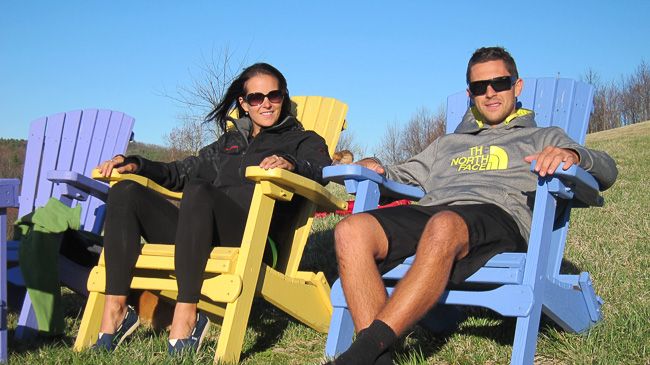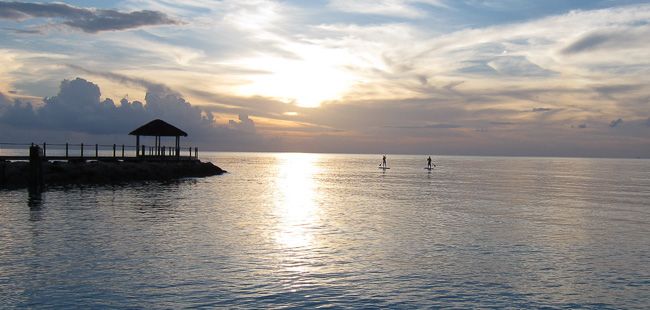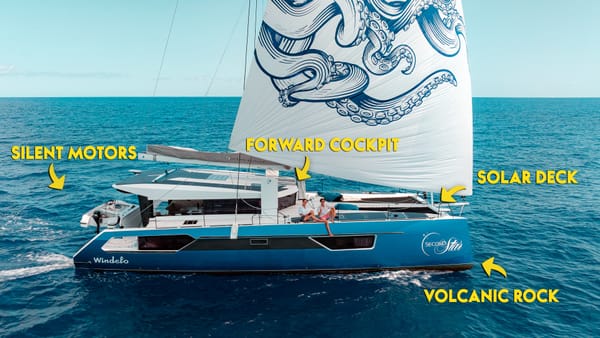Make Money and Travel – Chartering Yachts Around the World

Owen and Amanda aren’t your typical working class young couple, their job is to travel the world aboard a luxury yacht in search of beautiful weather and unspoiled sandy beaches. They are often forced to go wakeboarding, snorkeling and sunbathing in the crystal clear waters of the Caribbean.
Did I mention they’re getting paid really well to do all of this?
It’s true…but would you believe me if I said it’s damn hard work?

We first heard of this inspiring couple while driveway surfing with our friends Lynn and Hugh in West Jefferson, NC (they’re part of the family). What sparked our interest in telling their story is 1. We want to be on the water soon, and 2. The opportunity to make BIG MONEY and Travel The World. The more I talked with these two the more I realized its one helluva rollercoaster life in the charter business, but if you can hold on you’ll be taken care of financially and spiritually. Thanks to Owen and Amanda for sharing their lives in such great detail, they don’t have a blog, they don’t benefit from our article, they are just good people who are hoping to help other dreamers start their own adventure.
This is one of our longer, more in-depth Make Money and Travel articles…so you’ll have to bear with us as our next big adventure is going to be on the water, so we had a lot of questions for these two. If you’re inspired, have questions or just want to thank Owen and Amanda for sharing, please leave a comment below. Enjoy!
The Job(s)
Describe your working situation and what line of work you’re in. Have you always had this job? At what point did you realize that you could bring in enough income to continually fund a location independent lifestyle?
We live and work on a private yacht, me (Owen) as the first mate and Amanda as chief stewardess. Both of us have to help each other out at times so our daily duties are varied. Amanda drives the tender and Owen has to help with making beds and doing laundry.
Our main income is the salary we get as professional yacht crew. We also have a small rental property portfolio developing in New Zealand (our home country). Rental income covers all of our house expenses which is great. We put a little cash towards the mortgage every month to pay it down faster.
I completed a plumbing and gas fitting apprenticeship and worked in NZ for 8 years before going to sea. Amanda was a partner in an importing and sales business in NZ after spending a few years as a travel agent. We met on our previous yacht in the south of France, only to learn that our home towns in NZ are only an hour drive apart.
Although we don’t get to choose the destinations we travel to, we are paid very well and have absolutely no living expenses…so we kind of think of our lifestyle as a “working holiday”. Yachts tend to follow favorable climates, beautiful beaches and glamorous coastal towns or cities. Our last yacht was 450ft, had a crew of 50 and is strictly private. The yacht we are on now is much smaller at only 100ft with a crew of four. It is privately owned and used for charters in the Virgin Islands and the Bahamas. When the owners want the boat close we dock outside their house in Miami. Chartering is new to us, it can be very taxing on your body and mind, but the tips more than make up for the lack of sleep!

The Hours
How many hours do you put in a week and what does a typical workday look like for you?
We work Monday to Friday, 9-5 when there are no guests on board. Some days we finish earlier to take advantage of a great beach and have a few sundowners! (a sundowner is a drink consumed while watching the sun go down. I prefer beer, others prefer fruity cocktails. Wine is also acceptable. Gin and Tonic helps keep the mosquitos away.)
On the larger yachts, things are much more structured and getting an early finish on a Friday afternoon is rare. Someone always needs to be on watch, everybody has an important role to play in maintaining order on the vessel. The smaller yachts are a much more casual affair. It only takes a day to wash down the entire outside so as long as the work gets done, you can afford to have a longer weekend than others.
A typical day includes lots of little odd jobs, fixing anything that is broken, cleaning, polishing stainless steel, buffing out scratches, cleaning, detailing, dusting, laundry, cleaning, changing light bulbs, oil changes, engine room maintenance, cleaning, cleaning and more cleaning.
Having the owners or charter guests on board means longer days so multiple 16-18 hour days are not unusual. As a member of the Yacht Crew you are always on call for the guests, whatever they want, you provide. Setting up a beach with chairs, umbrellas, towels and a cooler full of drinks. Launching the jet skis, paddle boards and kayaks. Blowing up the water toys and towing people behind the tender for wakeboarding and skiing. Snorkeling, diving and fishing. Walks, restaurant drop offs, getting more fresh fruit for the chef, all while keeping an eye on the guests and ensuring their safety. We have to remember where they misplace their sunglasses, explain how to use the DVD players, reassure them that pirates won’t board us in the night and make sure the wine is chilled to their exact preference. You have to anticipate their next move and be ready for anything at any time. As well as making beds, drying out showers and replacing towels two or three times a day, setting the table, serving breakfast lunch and dinner, making 6 different cocktails at the same time, remembering when the drier is going to finish, folding the laundry without being seen. Packing up all the equipment you put out in the morning, cleaning sea gull poop off the out board engine and picking up the anchor to move into another bay on another island or bay. Somewhere in the middle of all that you find a few minutes to eat and if you are lucky you might get more than 6 hours of sleep before you have to wake up and do it all over again.
Do you have to clean barnacles, etc from the hull of the boat ever? Just wondering, so many sailors we talk to say that’s the worst part of boat maintenance, having to go under the boat and remove junk.
Maintenance is never ending but if it got to the point that we had barnacles growing on the hull probably means we aren’t doing our jobs right. The standard of care and attention to detail is far higher than your usual mum and dad sailors…(sorry Hugh and Lynn!). Even having water spots on the windows or stainless is unacceptable. So, you live on the sea, get covered in salt water, rinse it off with fresh water and then run around and dry everything so everything is spotless. Then you do it all over again the next day. And the day after that maybe twice because the guests wanted to move the boat to a different bay but didn’t like it after 2 hours and wanted to go back to the one they were already at. Wash, rinse and repeat!
At times, you need to squeeze into tight, cramped places to clean or repair something. Usually those jobs are kept for the junior ranks. There are moments you wonder why you do what you do, but when you step back outside and look at the view, you forget you are covered in poo and grease and stinking bilge water. Then you go and have a beer at the beach.
The Pay
If you are willing to say, what is the average yearly salary for someone in your line of work? How long did it take for you to start earning a comfortable/typical living for this line of work? If you don’t feel comfortable giving numbers tell us, are you scraping by, are you able to put money in savings and pay your bills or are you raking it in? Obviously it varies greatly depending on your boss.
Salaries are payed monthly and range from $2500-$3000 for an entry level role. Longevity and qualifications are rewarded well. We are doing better than entry level. All yachts have slightly different pay structures. Some yachts give generous vacation time and pay very well, others pay poorly and give very little time off. We earn a very good base salary each month and have the bonus of each getting a $500 “charter incentive” for every charter we do. We usually do around 2 charters a month. Our running average for tips is about $2250 per charter. Charters are usually 7 days. So, each earning around $5000 extra per month on top of our salaries is pretty good. The tradeoff is that you miss out on a “real life” at home seeing your family and friends regularly. Owen recently obtained a captains license and the intention is to run a yacht and take advantage of the better money on offer. A rule of thumb for a captain on the smaller yachts is being paid $1000 per foot of boat length per year. So, running a 100ft yacht would yield a $100k+ salary. A chief stew or chef would earn upwards of $45k. It all depends on the owner, the movements of the yacht and how well experienced you are in your role.
Are the entry level salaries per person? I’m assuming they’re not combined for the both of you. Same goes for tips, bonuses, etc?
All pay is per person. You get a decent base salary and depending on how generous or tight the owners are, you get bonuses too. Getting an extra month or half month of pay for Christmas is not uncommon. Tips are worked out as a percentage of the weekly cost to charter the yacht. So for us, 20% on 45,000 is $9000 split 4 ways for an extra $2250 for a week’s work, per person. So, you can imagine that doing 2 charters per month starts to get pretty exciting. Plus we get a $500 “charter incentive” from the owner per week of charter.
(Amanda and I are looking to run our own yacht in the near future and when you are a Captain and Chef couple running a 18m-22m, you can earn huge money, charters are usually at a cost of $30,000 per week, then you get to keep all the tips!)
That’s a handsome amount of pay, but a serious amount of crazy work, what does it cost to charter out a yatch?
Charters depend on the age and size of the boat, owners’ requirements, location etc, we are 30m and charter for $45,000 per week. I worked on a 65m in the Med that chartered for $400,000 Euro per week. That is purely for the boat. On top of that, guests pay the expenses of food, beverage, fuel, docking, park fees, taxis and any other costs associated with having them on board. (I have met Saudi royalty too). Most people who charter are businessmen and their families looking to get away and unwind. You will no doubt hear horror stories about movie stars or musicians being total jerks, and I have seen some of that too, BUT, the TV show “Below Decks” is fabricated Bullshit. Capital B for Bullshit. Most people are very respectful and great to meet.
The Tools
What are the most essential pieces of equipment, education or programs you need for working while traveling?
The absolute minimum requirement is a course called, STCW95. This is a basic fire fighting, sea survival and first aid course that anyone wanting to work on a yacht needs to have.
After that, there are plenty of optional courses for interior crew to take. Wine knowledge, floristry, bar tending/service industry experience and beauty/health care are all very useful attributes for interior crew.
The exterior crew can take courses to work their way to becoming a captain. Sea miles and time at sea are essential for progressing through the ranks. A strong service skill set is paramount to anyone wanting to work close to guests. Having Scuba qualifications and other water sport skills can be advantageous.
Engineers can hide away and keep out of sight on the larger yachts. Although the work can be grubby and hot. There is a shortage of qualified, competent engineers in the marine industry.
Chefs work long hours, have to meet all sorts of dietary requirements and stand up all day long. It can be very hard keeping the crew full and happy as well as cooking 8 paleo and 2 gluten free meals for 10 guests who say they won’t eat pork but demand a big bowl of bacon for breakfast every day.
Anyone wanting to work on a yacht needs to be a social animal who doesn’t mind living in a cramped environment close to people who might be really annoying at times. You can’t just get off and go for a walk or a drive after work to clear your mind. You might be stuck at sea for very long periods of time trying to stay positive and happy while serving people who can be very demanding and sometimes even rude.
Is there a school to take the courses you mention (Wine, Florist, bar-tending, SCUBA), or are the courses completed online?
Courses are generally all practical and can be taken at schools around the world. There are always theoretical components and criteria that need to be met. Anyone wanting to start out needs to do an STCW95 and you can find your nearest school on the net. Scuba diving is a recreational certificate that can help on some yachts but having a general interest and knowledge of water sport helps too. Maybe someone who likes wake boarding or kite surfing will find a job over someone who has never done those things before. For the interior roles, service experience is great, bar knowledge too. Some yachts hire nannies and nurses as well as massage and beauty therapists. However, the new interior crew on some yachts will get stuck doing endless laundry and cleaning duties, it is a hard and repetitive road to the top but it can be very worthwhile once you get there.
Is there a good place to “get your feet wet” for example should one seek out a cruise ship to gain some general knowledge before attempting to move into the private yacht world?
Cruise ships and luxury yachts do not have much in common. Some of the very large private yachts have commercially ticketed captains and officers as well as engineers. Only due to the complicated nature of the equipment involved. If you want to do a cadetship in the merchant navy and move into luxury yachts later you can do it. However, most of us start at the bottom and have a whole lot more fun doing it that way. You can educate yourself along the way to get captains tickets for various sized vessels. Trying to get an entry level job on a cruise ship and then moving to a luxury yacht would in my opinion be a total waste of time. The two industries are just not really comparable.
The Client(s)
Who are your clients? Do you find them or do they find you and how? What is your rejection rate? How many clients do you pitch to finally win over one? You don’t have tell us who your clients are directly, just how you go about getting the work.
Getting work on yachts is usually best done by networking and getting your hands dirty. You really have to prove yourself as a hard worker and have the right personality for the yacht. Some captains will prefer some nationalities over others due to the visa requirements of the countries a yacht might visit. Plenty of South Africans are working on yachts but if a yacht stays in Hong Kong for 6 months and South Africans are only granted 3 weeks entry, it makes no sense to employ someone who has to leave all the time.
Owen has used a fantastic crew agent in New Zealand. Rachel Harrison at IMG in Auckland is the greatest. A good agent understands the captains requirements and matches crew accordingly. Yachts can be very specific in the requirements for crew. For example, a captain might like a male deck hand aged in his mid-twenties, who speaks English and Spanish, non-smoking and tattoo free, is a dive instructor and has at least one year of experience on yachts over 160ft.
Due to the particular requirements of owners and captains, your rejection rate may be very high but it could have nothing to do with your personality. It could be just that the yacht needs something you can’t provide. Once you are in, you have to work hard and keep your head down for a while. Once you are seen to be a good crew member, the pay will increase, responsibilities will increase, it will become a lot of fun. There is a lot to learn and not often much time to be taught so you will likely end up doing all the boring or difficult jobs that the more experienced crew don’t want to do. Some interior crew can end up living in a laundry ironing all day for months on end for example. As glamorous as the boats look from the outside, they are shiny and glamorous because of the constant work that goes into them. Scrubbing toilets and decks on your hands and knees is all part of maintaining the image.
The Up’s
What are the best 1-3 positive things about working while traveling? Those things that make you think wow; I really am living the dream.
Sitting on a beach together with a bacon cheese burger, cold beer and a pocket full of cash at the end of a long week, watching the sun go down and knowing that I don’t have to get up early and sit in traffic on my way to unblock a toilet tomorrow morning!
Coming from NZ, being so close to new countries and cities and actually having the time and means to explore and learn at our own pace. We usually take advantage of the yachts location and visit a new place when we get some time off. In the last 18 months we have spent 4 nights in New York, had a week in Paris, visited Nepal and hiked in the Himalayas, been home to NZ, driven across Australia from Sydney to Perth in a campervan, toured Rome on segways for 10 days and got engaged, lived in Antibes, France and free lanced for a few months, driven up and down the east coast of the US between Miami and Charlotte 3 times stopping over in Charleston and Savannah as well as spending time with Hugh and Lynn in West Jefferson. (H&L are the most hospitable uncle and aunt you could ever hope to have, we are so grateful to have been allowed to crash there, they don’t really know how much we appreciated our last stay with them!) We have also had a week in Puerto Rico and a week in Washington DC. Not to mention all the time we were actually at work in the Virgin Islands, Turks and Caicos Islands and the Bahamas.
The absolute best thing about doing what we do, is doing it together. The memories and stories we are creating are unbeatable. We experience everything together and are both very lucky to have the same ideas about how long we will continue at sea and what we will do with what we earn when we get home.

The Down’s
What are the most frustrating things about working while traveling? Any ways you’ve found to avoid or cope with this frustration?
Having to work with people you might not actually have anything to do with if you had a land job. At least you can go home from work and forget about someone you don’t get along with when you have a land job. On a yacht, you are stuck with them. It can be a real challenge.
Missing out on interaction with your friends and family. Missing funerals, weddings, birthdays, Christmas and everything else. We are currently watching our nephew grow up on skype, its not ideal but it’s the best we can do. Owen even watched his Nana’s funeral via webcam. You have to be prepared for this reality every time you leave home, you say goodbye to everyone and you just hope that everything will be alright when you next go back. It can be very hard sometimes, you make your choices and you have to live with them.
Hindsight
If you could go back in time and give yourself advice about starting in this line of work, what would it be?
Start early, save half your pay and get your qualifications as soon as you can. Yachting is a great way to earn lots of money, see the world, meet great people, learn essential life skills and party like never before. The one regret is partying a little too hard and not saving enough in the first couple of years. Everything is just too exciting. There is no other job in the world that pays as well and offers the opportunities that yachting does, all with zero living expenses.
The Fantasy Job
What is one of the most creative ways you’ve heard of someone funding a location independent lifestyle? The one that made you wish you had thought of it first!
We already live in fantasy land!

You live in “fantasy land” but we’re just wondering would you want to own your own boat (or maybe an RV) one day, either just for your own adventures, or maybe to charter like your employers?
 The only boat we want to own would be used in a fresh water lake, pulled out on a trailer and stored in a garage. Boats are just so expensive to maintain, although we know pretty well what it takes, we wouldn’t want to have to pay for it. B.O.A.T – But Only Another Thousand. As for road trips, we love them. It’s something we would like to do more of for sure. We think touring the US would be really fun and plan to visit every single state, but it will take a few more years yet.
The only boat we want to own would be used in a fresh water lake, pulled out on a trailer and stored in a garage. Boats are just so expensive to maintain, although we know pretty well what it takes, we wouldn’t want to have to pay for it. B.O.A.T – But Only Another Thousand. As for road trips, we love them. It’s something we would like to do more of for sure. We think touring the US would be really fun and plan to visit every single state, but it will take a few more years yet.
P.S. The Kiwi is our national bird and we take a mascot for photos everywhere, the looks we get from some people are priceless!
Your Homework
Now it’s time for you to think outside the box. There’s no set of guidelines and anything is possible. Would you hit the water to rub elbows with the rich and famous so you could see the world? Sure it’s not for everyone, but SuperYachts are becoming more popular! If you own one of these yachts and would like to invite us for a sundowner please send an invite in the comments below!
If you would like to share your location independent lifestyle, tell us about it in the comments below or shoot us an email to become a part of the series. You can read the full series here: Make Money and Travel




